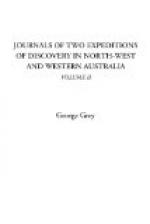Three modes of taking fish are commonly practised: spearing them; catching them by means of a weir; and taking them in a net. A party of natives spearing fish in one of their large shallow estuaries is an extremely picturesque sight; they follow all the tortuous windings of the fish they are pursuing, as it darts about in the water, with great rapidity; and, the object of their pursuit being concealed from a distant spectator, they appear to be running about in the sea and dashing up the foam for no conceivable cause or reason. Notwithstanding the speed they are running with and the smallness of the object, in striking they rarely miss their aim. In deep rivers or in the sea the mode of spearing fish varies according to the circumstances of the case; sometimes it is done by diving, sometimes by sitting on a rock or tree and watching them as they pass underneath; but in all cases astonishment is excited to see the celerity and accuracy with which the eye and hand act in the nicest unison.
Weirs are only constructed across places which are left nearly dry at low-water, or when the floods subside; and the way in which fish are taken in the net offers nothing remarkable.
METHODS OF COOKING FISH.
If the fish are not cooked by being merely thrown on the fire and broiled they dress them in a manner worthy of being adopted by the most civilized nations; this is called “Yudarn dookoon,” or “tying-up cooking.” A piece of thick and tender paperbark is selected and torn into an oblong form; the fish is laid in this, and the bark wrapped round it as paper is folded round a cutlet; strings formed of grass are then wound tightly about the bark and fish, which is then slowly baked in heated sand covered with hot ashes; when it is completed the bark is opened and serves as a dish: it is of course full of juice and gravy, not a drop of which has escaped. Several of the smaller sorts of freshwater fish, in size and taste resembling white-bait, are really delicious when cooked in this manner; they occasionally also dress pieces of kangaroo and other meats in the same way.
FEASTING ON A STRANDED WHALE.
A whale is the greatest delicacy that a native can partake of, and, whilst standing beside the giant frame of one of these monsters of the deep, he can only be compared to a mouse standing before a huge plum-cake; in either case the mass of the food compared to that of the consumer is enormous. It is impossible for civilized man to enter into the feelings of the savage under these circumstances, for he has never been similarly situated. He never has had such a quantity of food that he doats on placed at once before him; hence when a native proprietor of an estate in Australia finds a whale thrown ashore upon his property his whole feelings undergo a sudden revulsion. Instead of being churlishly afraid of the slightest aggression on his property his heart expands with benevolence, and he longs to see his friends about him; so he falls to work with his wives and kindles large fires to give notice of the joyful event.




